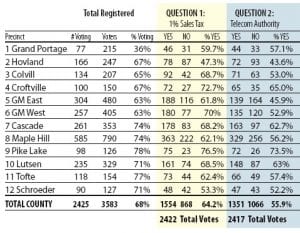Thevotes in the 2009 election referendum have been tallied and the question of whether or not Cook County should enact a countywide 1% sales tax has been answered by voters, as has the second referendum question, asking if the county should establish a telecommunications system. The first question passed; the second failed.
The sales tax question needed a simple majority (over 50%) to pass— it exceeded that and received support from 64.2% of the county’s voters. The only precinct in the county to answer no to the 1% sales tax question was Hovland, which had only 47.3% yes votes.
The tax will not be implemented immediately. County Auditor Braidy Powers said the county must pass a resolution and develop an agreement with the Minnesota Department of Revenue to collect the tax. The Department of Revenue must have 90 days after the first day of the calendar quarter, which would be January 2010, so the earliest the 1% tax could be collected is April 2010.
The 1% sales tax will be used for projects selected for funding by the Cook County commissioners in August 2009. Seven projects will receive full or partial funding from the proceeds of the tax ($20,000,000 plus the cost of bonding). The projects are outdoor recreation facilities in Grand Marais; outdoor recreation facilities at Birch Grove in Tofte;fiber optic infrastructure (broadband); Grand Marais Library improvements; Community/ Civic Center; a biomass district energy plant; and improvements for Superior National at Lutsen golf course.
When the funding will be available is yet to be determined. Thecounty will have to decide whether it wants to seek bond funding for all of the projects at once, or wait and bond when proposals are further along. Powers said the county could bond more than once, but said there are additional costs with each bond issue. However, if projects are not going to happen for a year or two, it is not cost effective to “hold” the money. “When funding will be available is not an easy question,” said Powers. “That depends on the projects—what’s ready and what’s not. That is something the county board needs to decide.”
By law, 65% of the ballots received by the county needed to answer yes to the second referendum question in order for the county to be allowed to run a phone service. Two precincts cast the required number of votes (or more) to pass the referendum—Croftville and Pike Lake—but the rest of the county did not follow suit. The proposal to establish a telephone exchange to be used as part of a broadband fiber optic cable system in the county fell short with 55.9% of the vote.
The day after the vote, local internet provider Boreal Access issued an announcement thanking citizens who voted yes, stating, “Thanks to you, sales tax funds are now available to help us realize our broadband future.”
Boreal Access has been supportive of the initiative to develop a broadband fiber optic cable system in the county and it reassured those who want the broadband project to continue that it will, despite the defeat of the second question. The Boreal announcement said that the telephone exchange was “just one small part of the overall project.”
Jim Boyd, of Friends of Broadband, a group of citizens working to bring broadband internet to all county residents, said he was not surprised by the negative vote on the second question.
Boyd said the broadband group was meeting on November 5. “We have a number of options to think over. We’re still waiting to see if we get the federal grant. If we got the grant, would that be incentive for another referendum? If there were another referendum, it would be ‘cleaner’ with just one question. It would be much easier to explain the need for a telephone system.
“There may be other alternatives— the law that requires a 65% threshold is not just a problem here in Cook County. This is a problem all over the United States. The FCC may seek to change this requirement, preempting the state requirement.
“We also want to explore the possibility that the telephone part of the proposal be spun off to a private entity. The question then is how would the county get that revenue?”
Asked if he felt the broadband group was starting back at square one, Boyd said no. “I don’t think so. I think this is an opportunity to proceed with a little more deliberation. We have time to consider where we are, what we’ve done and determine how to proceed.”



Loading Comments